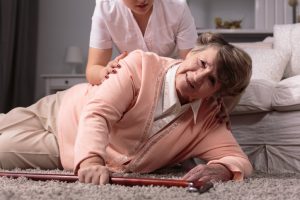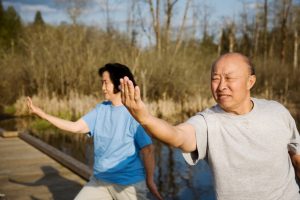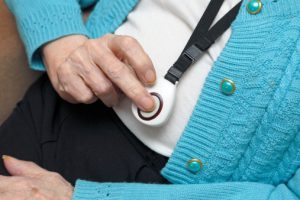September 22nd is fall prevention day in the United States. Falls are a leading cause of injury, death, and disability, especially in the older population. We at Bel Marra recognize this serious issue and what to inform our readers about disorders that could affect them and the best way to protect yourself. To give you a head start, we have rounded up a list of topical articles that can teach you about fall prevention, the relationship between dementia and falls, and how falls related to post-traumatic stress disorder and sarcopenia.
Dementia and falls: Causes and remedies to prevent falls in seniors
 Although dementia can affect a person’s memory, it can also increase their risk of experiencing falls. As dementia progresses, a person’s ability to walk or move diminishes, which eventually turns sturdy steps into more of a shuffle movement. The risk of falling increases if there are obstacles (such as rugs or objects) in a patient’s way, so it’s important to remove any potential cause of fall.
Although dementia can affect a person’s memory, it can also increase their risk of experiencing falls. As dementia progresses, a person’s ability to walk or move diminishes, which eventually turns sturdy steps into more of a shuffle movement. The risk of falling increases if there are obstacles (such as rugs or objects) in a patient’s way, so it’s important to remove any potential cause of fall.
Advertisement
Statistics show that every year 30 percent of seniors fall, but the rate is much higher among seniors with dementia.
Dementia can negatively impact a person’s perception, meaning they may not properly take a step or may be unable to notice objects or people in their peripherals. Continue reading…
Brain activity in older adults measured while walking and talking may predict the risk of falls
 Brain activity in older adults measured while walking and talking may predict the risk of falls. Study author Joe Verghese explained, “In older people who had no signs of disease that would make them prone to falls, higher levels of activity in the front of the brain, called the prefrontal cortex, were associated with a higher risk of falls later in life. This suggests that these people were increasing their activation of brain cells or using different parts of the brain to compensate for subtle changes in brain functioning.”
Brain activity in older adults measured while walking and talking may predict the risk of falls. Study author Joe Verghese explained, “In older people who had no signs of disease that would make them prone to falls, higher levels of activity in the front of the brain, called the prefrontal cortex, were associated with a higher risk of falls later in life. This suggests that these people were increasing their activation of brain cells or using different parts of the brain to compensate for subtle changes in brain functioning.”
The researchers looked at 166 people over the age of 75 with no disabilities, walking problems, or dementia. The researchers used brain imaging to measure changes in oxygen in the blood in the frontal part of the brain while participants walked, recited parts of the alphabet, and did both at the same time. Participants were then interviewed every couple of months over the next four years regarding any fall incidents. Continue reading…
Tai chi may prevent falls in older people and improve mental health: Study
 Tai chi may prevent falls in older people and improve mental health, according to research findings. On the other hand, this ancient Chinese martial arts does not improve cancer symptoms or rheumatoid arthritis.
Tai chi may prevent falls in older people and improve mental health, according to research findings. On the other hand, this ancient Chinese martial arts does not improve cancer symptoms or rheumatoid arthritis.
The benefits of tai chi have long been studied, but the results have often been contradictory. The researchers decided to compare the results from the previous works in order to draw some definitive conclusions about the benefits of tai chi.
The researchers reviewed 35 studies on tai chi and looked at its effectiveness in treating various conditions, such as cancer, Parkinson’s disease, musculoskeletal pain, osteoarthritis, rheumatoid arthritis, cardiovascular disease, high blood pressure, osteoporosis, and type 2 diabetes. Some studies also looked at the benefits of tai chi on psychological health, along with balance and fall prevention. Continue reading…
Post-traumatic stress disorder (PTSD) symptoms may develop in elderly who have had serious falls: Study
 Post-traumatic stress disorder (PTSD) symptoms may develop in elderly who have had serious falls. Lead author Nimali Jayasinghe explained, “Anyone who goes through an accident in which they feel their life may be in danger or they could get physically harmed can develop post-traumatic stress symptoms.”
Post-traumatic stress disorder (PTSD) symptoms may develop in elderly who have had serious falls. Lead author Nimali Jayasinghe explained, “Anyone who goes through an accident in which they feel their life may be in danger or they could get physically harmed can develop post-traumatic stress symptoms.”
Advertisement
The patients were assessed using the Post-Traumatic Stress Scale, which measures 17 symptoms of PTSD. Background information was also collected including marital status, previous mental health issues, details about their fall, and current health conditions. Majority of patients fell in their homes and received help within an hour. Continue reading…
Falls and fractures in the elderly linked with muscle loss, sarcopenia
 Recent research has revealed that older adults who suffer from age-related muscle loss are at higher risk of experiencing falls and fractures. The researchers, from the University of Southampton, looked into sarcopenia – muscle loss and function – and found that those with the highest reported muscle loss had the most falls and prevalence of fractures within a year.
Recent research has revealed that older adults who suffer from age-related muscle loss are at higher risk of experiencing falls and fractures. The researchers, from the University of Southampton, looked into sarcopenia – muscle loss and function – and found that those with the highest reported muscle loss had the most falls and prevalence of fractures within a year.
Muscle loss for those between the ages of 40 and 80 ranges from 30 to 60 percent and is associated with disability, sickness and death. Unfortunately, there are no universal guidelines to diagnose a person with sarcopenia and thus reduce their risk. Continue reading…
